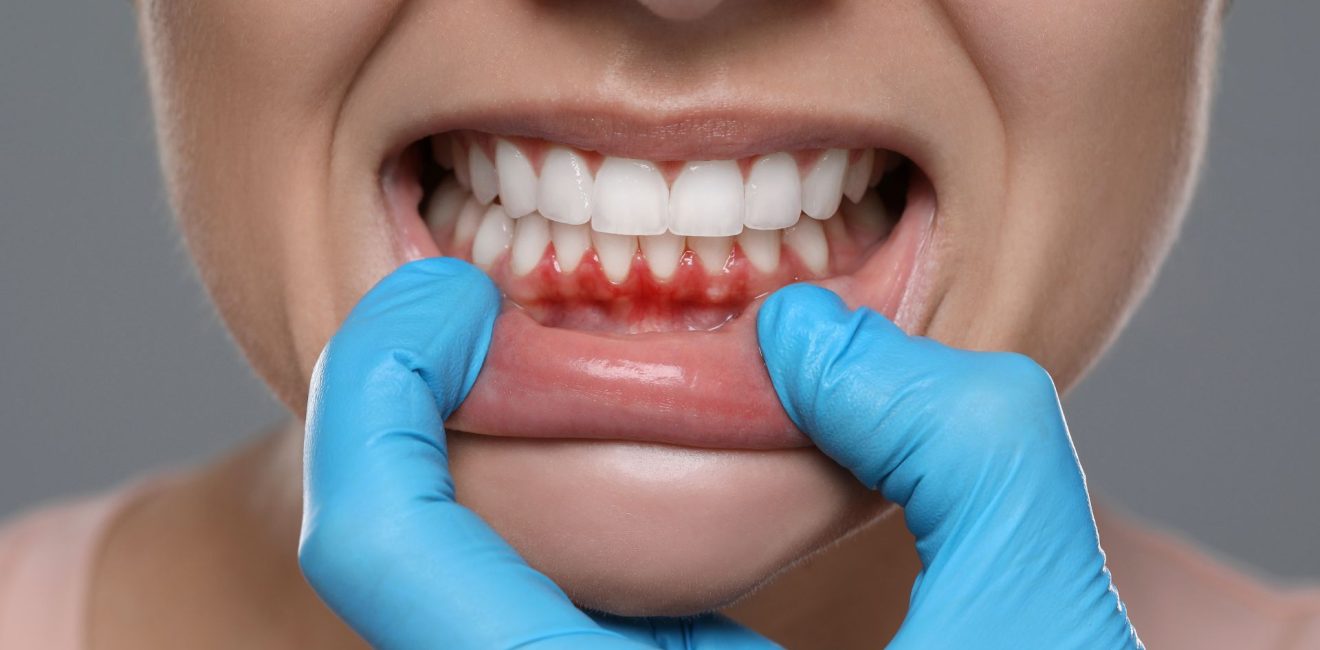Maintaining healthy gums is just as crucial as taking care of your teeth. Yet gum disease remains one of the most common oral health issues worldwide, often developing silently until significant damage has occurred. Understanding the warning signs and prevention methods can save you from painful treatments and preserve your smile for years to come.
Key Takeaways
- Gum disease progresses through stages, from mild gingivitis to severe periodontitis
- Early warning signs include bleeding gums, persistent bad breath, and gum recession
- Regular dental check-ups at clinics like PureSmile can catch gum disease before it becomes serious
- Daily oral hygiene habits are your first line of defense against gum problems
- Professional dental cleanings twice yearly are essential for preventing gum disease
- Treatment options vary depending on the severity of your condition
Understanding Gum Disease: The Silent Threat
Gum disease, also known as periodontal disease, begins when bacteria in plaque build up along and under your gumline. This bacterial invasion triggers inflammation, the body’s natural response to infection. While initially protective, prolonged inflammation damages the soft tissue and bone that support your teeth.
What Happens in Your Mouth
When plaque accumulates on your teeth, it forms a sticky film of bacteria. If not removed through brushing and flossing, this plaque hardens into tartar (calculus), which can only be removed by professional cleaning at a dental clinic. Shanghai residents and expats alike often underestimate how quickly this process can occur – tartar can form in as little as 24-48 hours after plaque develops.
As bacteria multiply in the plaque and tartar, they release toxins that irritate your gums, causing inflammation. This marks the beginning of gingivitis, the earliest stage of gum disease.
Stages of Gum Disease: From Mild to Severe
Gum disease doesn’t appear overnight. It progresses through distinct stages, each with increasing severity and potential for damage.
Gingivitis: The First Warning
Gingivitis is the mildest form of gum disease. At this stage:
- Your gums become red and swollen
- You may notice bleeding when brushing or flossing
- There’s typically little to no discomfort
- The condition is completely reversible with proper care
Many patients visiting PureSmile are surprised to learn they have gingivitis, as the symptoms can be subtle enough to ignore. The good news is that with proper brushing, flossing, and professional cleaning, gingivitis can be completely reversed before any permanent damage occurs.
Early Periodontitis: Damage Begins
If gingivitis goes untreated, it progresses to early periodontitis:
- Inflammation spreads deeper into the tissues
- Pockets form between your teeth and gums
- Bacteria colonize these pockets, causing further infection
- Early bone loss may begin
- You might notice increased sensitivity and discomfort
At this stage, professional intervention becomes necessary, though damage can still be minimized with prompt treatment.
Moderate to Advanced Periodontitis: Serious Concerns
As the disease advances:
- Gum pockets deepen, collecting more bacteria
- Significant bone loss occurs
- Teeth may become loose
- Chewing becomes painful
- Gum recession becomes noticeable
- Bad breath becomes persistent
By the time periodontitis reaches these stages, professional treatment at a dental clinic like PureSmile becomes essential to prevent tooth loss and manage the infection.
Warning Signs: What Your Gums Are Telling You
Your gums often provide clear signals when something’s wrong. Being alert to these warning signs can help you seek treatment before permanent damage occurs.
Red Flags You Shouldn’t Ignore
- Bleeding gums: Even slight bleeding during brushing or flossing isn’t normal
- Red, swollen gums: Healthy gums should be pink and firm
- Receding gums: If your teeth look longer than before, your gums may be pulling away
- Persistent bad breath: Bacteria causing gum disease often produce unpleasant odors
- Tender or painful gums: Discomfort when chewing or when touching your gums
- Loose teeth: Advanced gum disease weakens the supporting structures of your teeth
- Changes in how your teeth fit together: Shifting teeth can affect your bite
- Pus between teeth and gums: A clear sign of infection that needs immediate attention
If you notice any of these symptoms, scheduling an appointment with a dental professional at a dental clinic in Shanghai or your local area should be your priority.
Risk Factors: Are You More Susceptible?
While poor oral hygiene is the primary cause of gum disease, several factors can increase your risk:
Lifestyle Factors
- Smoking and tobacco use: Perhaps the most significant risk factor, reducing blood flow to gums and impairing healing
- Poor nutrition: Especially diets low in vitamin C and other nutrients essential for gum health
- Stress: Weakens your immune system, making it harder to fight off infections
- Alcohol consumption: Excessive drinking can dry out your mouth and reduce saliva, which helps protect against bacteria
Health Conditions
- Diabetes: Affects your body’s ability to use blood sugar, increasing infection risk
- Hormonal changes: Pregnancy, menstruation, and menopause can make gums more sensitive
- Medications: Some drugs reduce saliva flow or cause abnormal gum tissue growth
- Genetics: Family history can play a role in susceptibility to gum disease
Understanding your personal risk factors helps you take appropriate preventive measures. At PureSmile, dental professionals can help assess your risk profile and create a personalized prevention plan.
Prevention: Your Daily Defense Against Gum Disease
The good news is that gum disease is largely preventable with consistent oral hygiene practices and regular professional care.
Essential Daily Habits
- Brush properly twice daily: Use a soft-bristled toothbrush and fluoride toothpaste
- Floss daily: Cleaning between teeth removes plaque from areas your toothbrush can’t reach
- Use antimicrobial mouthwash: Helps reduce bacteria that cause plaque
- Replace your toothbrush: Get a new one every 3-4 months or when bristles are frayed
- Stay hydrated: Drinking water helps produce saliva, which contains proteins and minerals that protect tooth enamel and fight bacteria
- Eat a balanced diet: Limit sugary foods and drinks that feed harmful bacteria
Professional Care
- Schedule dental check-ups every six months
- Get professional cleanings twice yearly
- Consider more frequent visits if you have risk factors
- Follow your dentist’s specific recommendations for your mouth
Regular visits to a dental clinic like PureSmile can catch the earliest signs of gum disease before you even notice symptoms. Professional cleanings remove tartar that home care can’t address, significantly reducing your risk of developing gum problems.
Treatment Options: From Simple to Advanced
If you already have signs of gum disease, treatments vary depending on the severity of your condition.
Non-Surgical Treatments
- Professional dental cleaning: Removes plaque and tartar above and below the gumline
- Scaling and root planing: A deep-cleaning procedure that smooths root surfaces to discourage further plaque buildup
- Antibiotic treatments: May include mouth rinses, gels, or oral medications
Surgical Options for Advanced Cases
- Flap surgery: Lifts back gum tissue to remove tartar and reduce pocket depth
- Bone and tissue grafts: Replace or encourage new growth of damaged bone or gum tissue
- Guided tissue regeneration: Stimulates bone and gum tissue growth
At PureSmile dental clinic in Shanghai, dental professionals offer comprehensive treatment options for all stages of gum disease, from preventive care to advanced periodontal treatments.
Special Considerations for Different Age Groups
Gum health needs change throughout your life, requiring different approaches at different ages.
Children and Teenagers
- Focus on establishing good brushing and flossing habits
- Be aware that orthodontic treatments can make cleaning more challenging
- Watch for early signs of gingivitis during puberty when hormonal changes increase risk
Adults
- Maintain consistent oral hygiene routines despite busy schedules
- Be aware of how conditions like pregnancy or stress affect gum health
- Address dry mouth issues that may arise from medications
Seniors
- Adapt oral hygiene techniques if dexterity becomes an issue
- Pay special attention to gum health if you have dentures or implants
- Be vigilant about professional care as risk increases with age
No matter your age, professional guidance from a dental clinic like PureSmile can help you navigate the specific challenges you face in maintaining healthy gums.
Frequently Asked Questions
Can gum disease affect my overall health?
Yes, research has shown links between gum disease and several serious health conditions, including heart disease, diabetes, respiratory infections, and certain cancers. The inflammation associated with periodontal disease appears to play a role in these connections.
Is gum disease contagious?
While the bacteria that cause gum disease can be transferred through saliva, having these bacteria doesn’t guarantee developing the disease. Your oral hygiene habits and immune system play significant roles in whether these bacteria cause problems.
Can receding gums grow back?
Unfortunately, once gums recede, they don’t grow back naturally. However, good oral hygiene can prevent further recession, and in severe cases, gum grafting procedures can cover exposed roots and restore some of the lost tissue.
How long does it take to reverse gingivitis?
With proper care, including thorough brushing, daily flossing, and professional cleaning, gingivitis can typically be reversed in about two weeks. However, maintaining these good habits is essential to prevent it from returning.
Will my insurance cover gum disease treatment?
Many dental insurance plans cover preventive care and some periodontal treatments. The extent of coverage varies by plan. If you’re concerned about costs, discuss payment options with your dental clinic. PureSmile offers various payment plans to help make necessary treatments accessible.
Taking Action for Healthier Gums
Gum disease progresses silently but can have devastating effects on both your oral health and overall wellbeing. By recognizing the warning signs early and implementing good preventive practices, you can protect your gums and maintain a healthy smile for life.
Remember that professional dental care is an essential partner to your home oral hygiene routine. Regular visits to a dental clinic like PureSmile provide professional cleanings, early detection of problems, and personalized advice tailored to your specific needs.
Don’t wait until you experience pain or obvious symptoms – by then, significant damage may already have occurred. Schedule your check-up today and take the first step toward healthier gums and a brighter smile.
Whether you’re experiencing symptoms of gum disease or simply want to prevent future problems, dental professionals are ready to help you achieve and maintain optimal gum health through education, prevention, and when necessary, effective treatment options.







